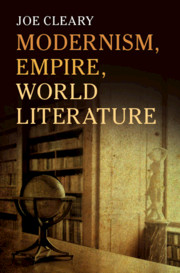Refine search
Actions for selected content:
5 results
Response to the Responses to Modernism, Empire, World Literature
-
- Journal:
- Cambridge Journal of Postcolonial Literary Inquiry / Volume 11 / Issue 3 / September 2024
- Published online by Cambridge University Press:
- 14 February 2025, pp. 347-356
-
- Article
-
- You have access
- Open access
- HTML
- Export citation
Introduction - Revaluations of Irish Expatriate Fiction
-
- Book:
- The Irish Expatriate Novel in Late Capitalist Globalization
- Published online:
- 29 October 2021
- Print publication:
- 11 November 2021, pp 1-28
-
- Chapter
- Export citation
Chapter 6 - World Literature
- from Part II - Recent Critical Methods Applied to Stevens
-
-
- Book:
- The New Wallace Stevens Studies
- Published online:
- 18 June 2021
- Print publication:
- 08 July 2021, pp 87-99
-
- Chapter
- Export citation
Chapter 1 - ‘A Language That Was English’: Peripheral Modernisms and the Remaking of the Republic of Letters in the Age of Empire
-
- Book:
- Modernism, Empire, World Literature
- Published online:
- 16 June 2021
- Print publication:
- 17 June 2021, pp 1-48
-
- Chapter
- Export citation

Modernism, Empire, World Literature
-
- Published online:
- 16 June 2021
- Print publication:
- 17 June 2021
